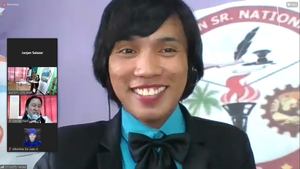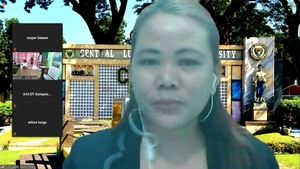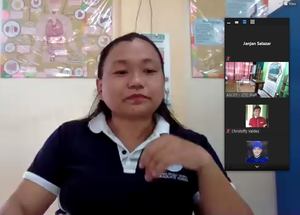


No matter what challenges the world is facing right now, it will still not hinder us from learning something new and increasing our knowledge on research about our language, culture, and literature.
This was proven by a webinar organized by the Aurora State College of Technology’s (ASCOT) Sentro ng Wika at Kultura in collaboration with the College’s Socio-cultural Affairs Office and Graduate Studies Department with the theme: “Pasiklabin at Pag-alabin ang Pananaliksik sa Wika, Kultura, at Panitikan Natin” via Zoom, Thursday, May 6.
Sharing their knowledge and expertise regarding the said topics, three Filipino language and literature teachers and Instructors from various educational institutions served as Resource Speakers on the said webinar.
Discussing different valuable tips and strategies on facing the challenges and processes of conducting effective research in literature, Dr. Baby Jean V. Jose, Assistant Professor from Central Luzon State University (CLSU), discussed the webinar’s first topic about “Mga Hamon at Proseso ng Mabisang Pananaliksik sa Panitikan.”
In her discussion, Dr. Jose shared her personal experiences in identifying possible research topics and problems about literature and formulating effective research methodologies that helped her develop results that help her and even her target clientele and beneficiaries gain knowledge and realizations when it comes to literature.
On the other hand, talking about the different emerging words in today’s society, especially in the Filipino language, and how Filipinos, especially the younger generations, use these words in their daily living, Dr. Christopher C. Valdez, Filipino Teacher and Researcher from Rosauro R. Tangson, Sr. National High School, discussed the second topic about “Salitang Balbal: Batayan sa Pagbuo ng Talasalitaan.”
In his talk, Dr. Valdez also discussed how often modern-day Filipinos use modern languages, how influential these terms are in their everyday living and the effects of using these kinds of languages in their day-to-day communications.
Meanwhile, giving the virtual participants knowledge and background on how the Kankana-ey Culture is continue being practiced in the rural areas, especially in today’s changing generations, Dr. Amelita B. Papica, Filipino Language Teacher and Researcher gave her talk about the third topic, “Kultura ng Kankana-ey sa Rural.”
In her topic, Dr. Papica also added ways to enrich more and continue the culture and history of our Kankana-ey brothers and sisters in some areas in Aurora Province.
According to her message during the Opening Program of the webinar, Ms. Glenda M. Nad, Director of the Sentro ng Wika at Kultura (SWK), said that this is the first time that the SWK in collaboration with the College’s Socio-Cultural Office and Graduates Studies Department will conduct a webinar like this.
Ms. Nad also added that from its establishment last 2009, SWK will always be committed and will do its best in continuing its service in promoting and enriching the Filipino language by spearheading different activities, projects, and programs like the said webinar even during these trying times.
